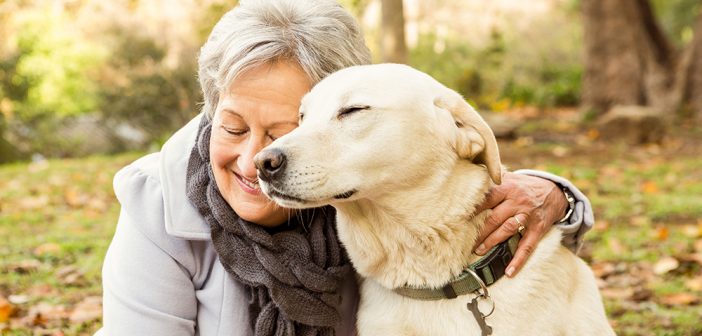For centuries, people have relied on their trusted pet for security, sport, and companionship. Turns out, the support of a loving dog or cat can be good for your health. From providing emotional support to encouraging exercise, studies show that pets (especially dogs!) influence early signs of depression, blood pressure, and heart rate.
“Companion animals may improve heart health by lowering blood pressure and regulating the heart rate during stressful situations,” wrote Dana Casciotti, Ph.D.
“In the past, a move to a nursing home or retirement community meant giving up this important bond with the animal world,” wrote contributor Mary Park Byrne. “While many retirement communities, assisted living facilities and nursing homes still don’t allow pets, it’s great that many of these assisted living communities have decided to integrate pets into their communities as the pet therapy benefits to the elderly are overwhelming.”
Here are four types of support a pet provides that most adults can’t:
1. Pets provide undivided attention.
A pet can share a look that says, “I understand,” without saying a word. That non-verbal encouragement generates a feeling of comfort, support, and unconditional love. Many of today’s seniors struggle with the lack of feeling needed and understood. A connection with a pet gives seniors a feeling of renewed purpose as this animal looks to them to provide food, exercise and an open lap to cuddle up in for an hour or two.
2. Pets have simple wants and needs.
3. Pets provide constant enthusiasm.
For a dog who gets a new toy or meets a new friend, this isn’t just a good day — this is the best day ever. That enthusiasm is a nice distraction for seniors enduring painful rehabilitation, depression or loneliness. As pet visits to care centers grow in popularity, many organizations are training animals to serve specific needs. In 1983, the Hawaiian Humane Society developed the People for Animals, Animals for People program. Over 30 years later, this program is supported by over 90 volunteers and visit over 64 hospitals, hospices, and senior and health care centers with service, therapy, and visitation animals.
4. Pets don’t judge.
Unlike humans who often squirm in hospital settings, animals aren’t deterred by a person surrounded by machines or who has difficulty communicating or moving around. A loving animal can make any situation work. Experts have discovered pet therapy works well with those suffering from Alzheimer’s or Sundowners Syndrome and the periods of increased agitation and confusion that accompanies these evening episodes. “The animals’ nonverbal communication and profound acceptance can be soothing for those with difficulty using language,” said Byrne. “Some may even connect with memories of their own treasured pets.”
For today’s skilled care nursing centers, discovering ways to keep residents engaged and progressing through necessary levels of care is an ongoing challenge. “We believe social and emotional health plays an important role in maintaining overall physical health,” said Shiloh Sorensen, activity director at Parke View Rehabilitation and Care Center.
By recognizing the existing animal-human bond that has existed and sustained adults for many years, you can incorporate care that satisfies the emotional needs of residents as well as physical healing.
This article was previously published by the Daily Herald and republished here with permission.




